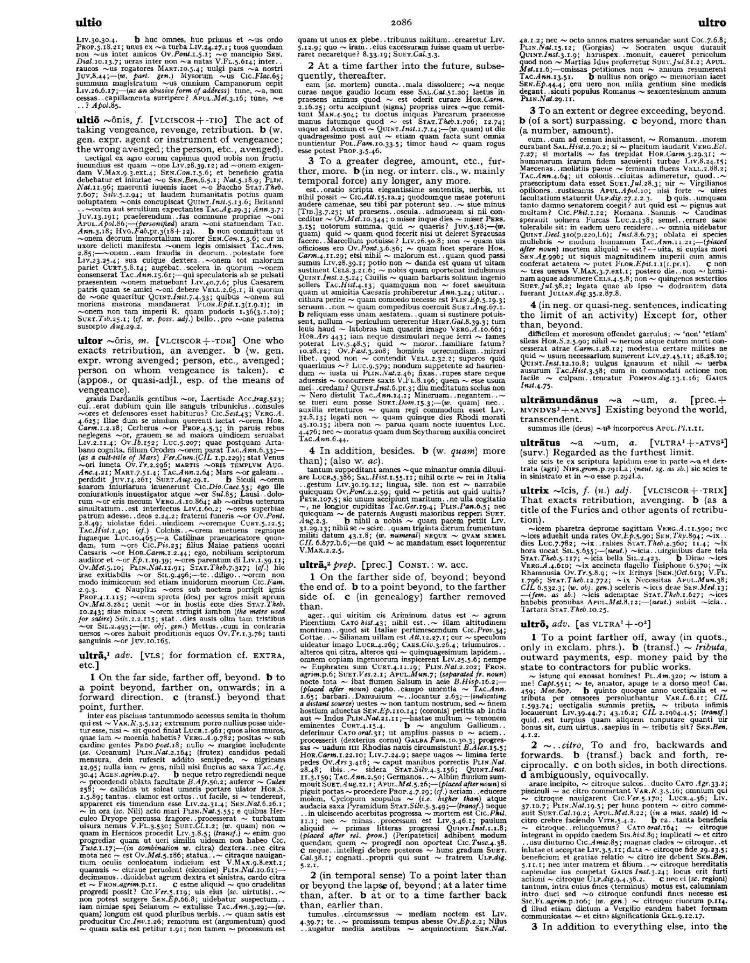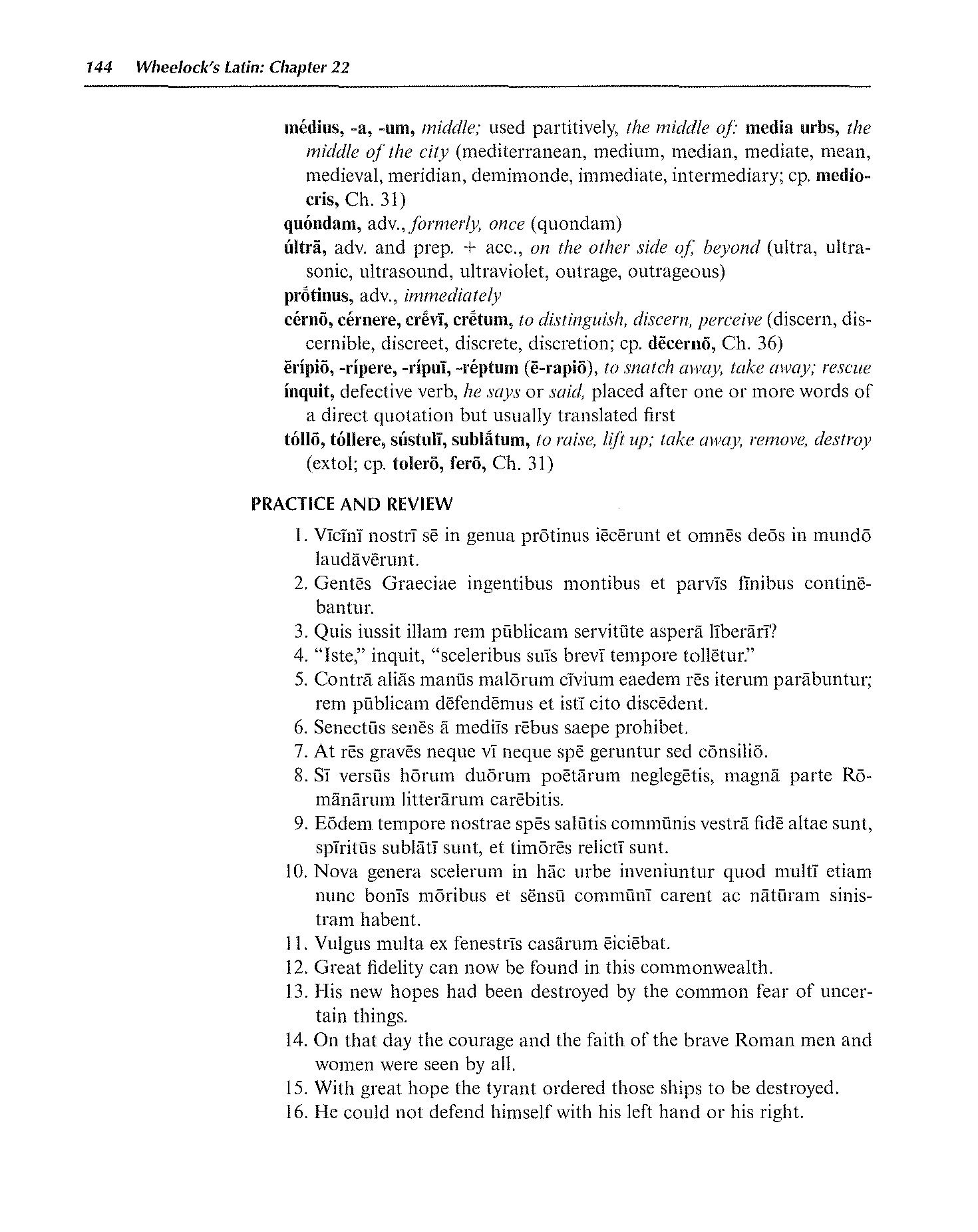
page_listing.tpl
page_subListingDetails.tpl
sub_listingDetails_style1.tpl
sub_listingDetails.title.tpl
ultrā beyond
ultrā is a Latin Adverb that primarily means beyond.
Definitions for ultrā
Wheelock's Latin
Adverb
- 1
prep. + acc., on the other side of, beyond
English derivatives:
ultra ultrasonic ultrasound ultraviolet outrage outrageous
Oxford Latin Dictionary
Adverb
- 1
On the far side. farther off, beyond. (b) to a point beyond, farther on, onwards; in a forward direction. (c) (transf.) beyond that point, further.
- 2
At the time farther into the future, subsequently, thereafter.
Preposition
- 1
On the farther side of, beyond; beyond the end of. (b) to a point beyond, to the farther side of. (c) (in genealogy) farther removed than.
- 2
(in temporal sense) To a point later than or beyond the lapse of, beyond; at a later time than, after. (b) at or to a time farther back than, earlier than.
- 3
To an extent or degree exceeding, beyond. (b) (of a sort) surpassing. (c) beyond, more than (a number, amount).
- 4
(in neg. or quasi-neg. sentences, indicating the limit of an activity) Except for, other than, beyond.
Sentences with ultrā
Latin to English
Est modus in rebus, sunt ceti denique fines, quos ultra citraque nequit consistere rectum.Compare There are fixed limits beyond which and short of which right cannot find a resting place.
Id in primis cavere oportebit, ne studia, qui amare nondum potest, oderit et amaritudinem semel perceptum etiam ultra rudes annos reformidet. Lusus hic sit.Compare Above all things we must take care that the child, who is not yet old enough to love his studies, does not come to hate and dread the bitterness which he has once tasted, even when the years of infancy are left behind. His studies must be made an amusement.
Nihil est peius iis, qui paulum aliquid ultra primas litteras progressi falsa sibi scientiae persuasionem induerunt.Compare There are none worse than those who, as soon as they have progressed beyond a knowledge of the alphabet, delude themselves into the belief that they are the possessors of real knowledge.
Caesar paullus ultra is locus castra transfero.Compare Caesar moved his camp a little beyond that spot.
Data sources
Notes
- Definitions
- Frederick M. Wheelock, Wheelock's Latin, 6th ed., rev. Richard A. LaFleur (New York, NY: HarperCollins Publishers, 2005): 144.
- P. G. W. Glare, Oxford Latin Dictionary, Vols. 1-8 (Oxford: Clarendon Press, 1982): 2086.
- Word frequencies
- Christopher Francese, "Latin Core Vocabulary," Dickinson College Commentaries, last modified 2014, http://dcc.dickinson.edu.
- Paul B. Diederich, The Frequency of Latin Words and Their Endings, PhD diss., (Columbia University, 1939).
- Louis Delatte, Suzanne Govaerts, Joseph Denooz, and Etienne Evrard, Dictionnaire fréquentiel et index inverse de la langue latine [Frequency Dictionary and Inverse Index of the Latin Language] (Liège, Belgium: Laboratoire d'analyse statistique des langues anciennes de l'Université de Liège [L.A.S.L.A.], 1981): 119-219.
Bibliography
Allen, Joseph H. Allen and Greenough's New Latin Grammar for Schools and Colleges: Founded on Comparative Grammar. Edited by James B. Greenough, George L. Kittredge, Albert A. Howard, and Benjamin L. D'Ooge. Boston, MA: Ginn & Company, 1903.
Crystal, David. A Dictionary of Linguistics and Phonetics. 6th ed. Oxford, UK: Blackwell Publishing, 2008.
Delatte, Louis, Suzanne Govaerts, Joseph Denooz, and Etienne Evrard. Dictionnaire fréquentiel et index inverse de la langue latine [Frequency Dictionary and Inverse Index of the Latin Language]. Liège, Belgium: Laboratoire d'analyse statistique des langues anciennes de l'Université de Liège (L.A.S.L.A.), 1981.
Diederich, Paul B. The Frequency of Latin Words and Their Endings. PhD diss., Columbia University, 1939.
Francese, Christopher. "Latin Core Vocabulary." Dickinson College Commentaries. Last modified 2014. http://dcc.dickinson.edu/latin-vocabulary-list.
Gildersleeve, Basil L., and Gonzales Lodge. Gildersleeve's Latin Grammar: Third Edition, Revised, and Enlarged. 3rd ed. London, England: Macmillan and Co., 1903.
Glare, Peter G.W. Oxford Latin Dictionary. Vols. 1-8. Oxford, England: Clarendon Press, 1982.
Krüger, Bernd. "Latin Conjugation Tables." Cactus2000. Accessed May 5, 2023. https://latin.cactus2000.de/index.en.php.
Pierson, Nick. "Sound of Text." Accessed October 26, 2019. https://soundoftext.com.
Wheelock, Frederick M. Wheelock's Latin. 6th ed. Revised by Richard A. LaFleur. New York, NY: HarperCollins Publishers, 2005.
Wiktionary Contributors. "Victionarium." Wikimedia Foundation, Inc. Updated March 18, 2019. https://la.wiktionary.org/wiki/Victionarium:Pagina_prima.
Citation
Chicago (17th ed.)
Allo Contributors. "ultrā (adv.) - Latin Word Definition." Allo Latin Dictionary. Last modified . Accessed February 20, 2026. http://ancientlanguages.org/latin/dictionary/ultra.
Entry created on . Last updated on .







